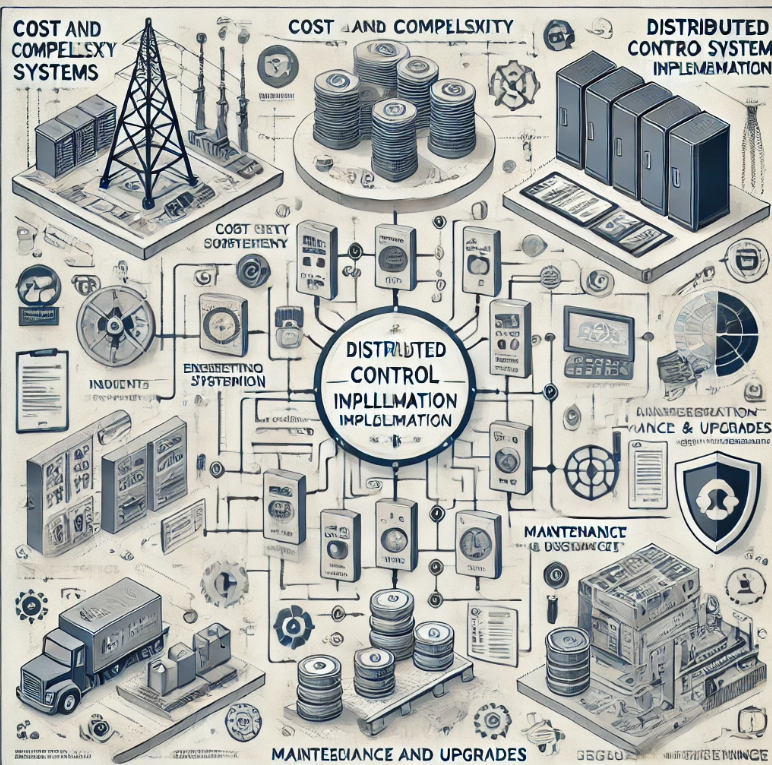Challenges and Considerations in DCS Implementation

Distributed Control Systems (DCS) provide numerous benefits, but their implementation and operation come with significant challenges. Understanding these challenges helps industries plan effectively and mitigate potential risks The four key challenges: Cost and Complexity of Implementation, Integration with Existing Systems, Maintenance and Upgrades, and Cybersecurity and Data Protection.
1. Cost and Complexity of Implementation
Overview
Implementing a DCS system is a major investment, both financially and in terms of time and resources. The complexity of designing and configuring a DCS tailored to an industry's specific needs adds to the challenge.
Key Challenges:
- High Initial Costs:
- Expensive hardware, software, and infrastructure.
- Skilled personnel required for installation and configuration.
- Complex Design Requirements:
- Customization for specific processes and operations.
- Detailed engineering to ensure compatibility and efficiency.
Considerations:
- Conduct a thorough cost-benefit analysis.
- Start with a scalable solution that allows for gradual expansion.
- Explore financing options to manage upfront costs.
Example:
A refinery installing a DCS for process control needs to account for expenses such as field devices, redundant controllers, and advanced software licenses.
2. Integration with Existing Systems
Overview
Integrating a DCS with legacy equipment and software is challenging due to compatibility issues and the risk of operational disruptions.
Key Challenges:
- Incompatible Technologies:
- Legacy equipment may lack support for modern protocols.
- Difficulty in retrofitting older systems with DCS components.
- Operational Disruptions:
- Risk of downtime during integration.
- Ensuring seamless data flow between old and new systems.
Considerations:
- Perform a comprehensive audit of existing systems.
- Use middleware or adapters to bridge compatibility gaps.
- Plan integration in phases to minimize disruptions.
Example:
A power plant upgrading to a DCS faces challenges in integrating its older SCADA system with modern controllers and HMIs.
3. Maintenance and Upgrades
Overview
Ongoing maintenance and system upgrades are necessary to ensure DCS systems remain efficient and reliable. However, these activities can be resource-intensive and disruptive.
Key Challenges:
- Frequent Maintenance:
- Regular calibration of sensors and actuators.
- Ensuring network reliability and minimizing wear and tear.
- Cost of Upgrades:
- Expensive hardware replacements.
- Software updates requiring specialized knowledge.
- Operational Downtime:
- Maintenance activities can interrupt production.
Considerations:
- Schedule maintenance during planned downtime.
- Invest in predictive maintenance tools to reduce unplanned outages.
- Opt for modular systems to simplify upgrades.
Example:
A pharmaceutical plant uses predictive analytics to plan maintenance for its batch production lines, avoiding disruptions during critical operations.
4. Cybersecurity and Data Protection
Overview
As DCS systems increasingly integrate with IoT and cloud technologies, they become vulnerable to cyber threats. Ensuring data security is critical to protect industrial operations and sensitive information.
Key Challenges:
- Rising Threat of Cyberattacks:
- Malware, ransomware, and unauthorized access can disrupt operations.
- Compliance with Regulations:
- Adhering to data protection laws and industry standards.
- Secure Remote Access:
- Enabling secure connections for remote monitoring and maintenance.
Considerations:
- Implement robust firewalls and intrusion detection systems.
- Use encrypted communication protocols and secure authentication mechanisms.
- Train employees on cybersecurity best practices.
Example:
An oil and gas company secures its DCS with multi-factor authentication and real-time monitoring to prevent unauthorized access.
Implementing and operating a DCS system comes with unique challenges that require careful planning and strategic decision-making. By addressing cost concerns, ensuring seamless integration, maintaining systems efficiently, and safeguarding against cyber threats, industries can maximize the benefits of DCS while minimizing risks.
